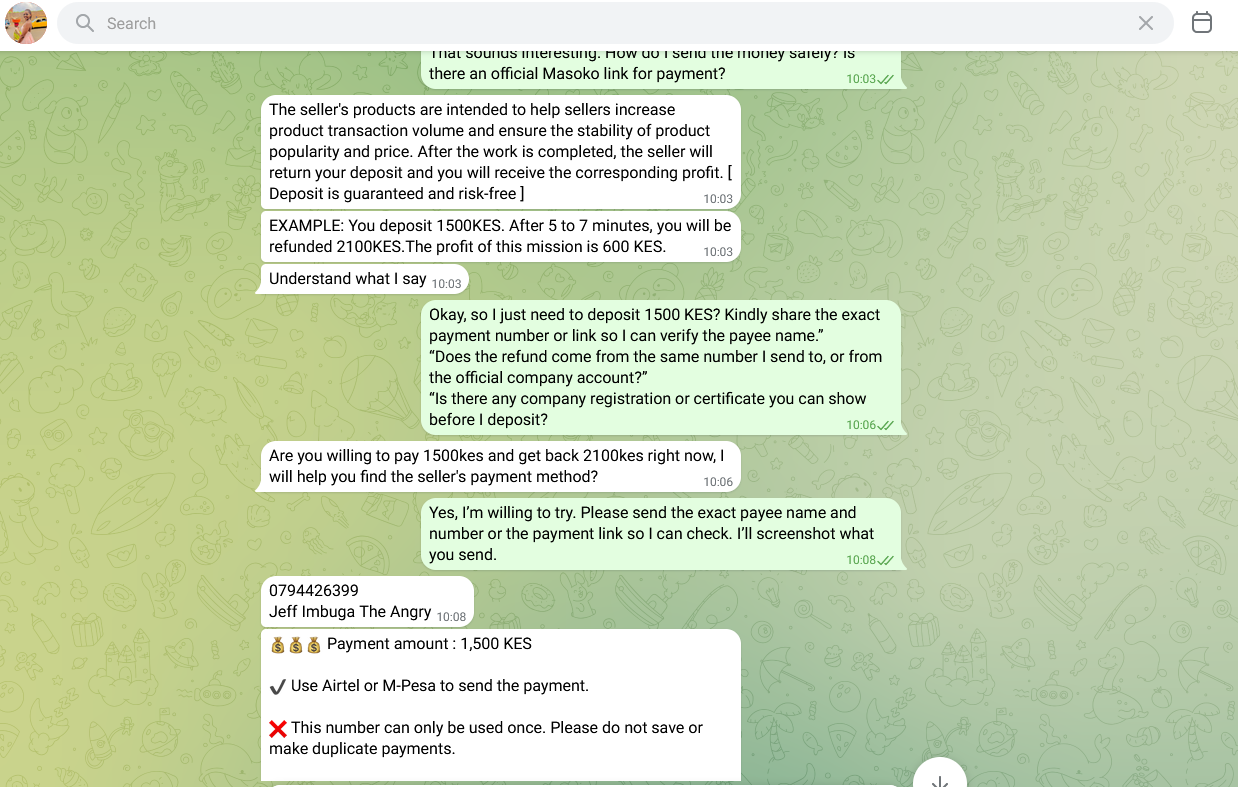By now, you’ve probably received one of these messages. A text from a Kenyan or foreign number asking if you’re ready to work online and earn an attractive daily income of Sh 8,000 or more. The senders claim to represent established e-commerce platforms, Kilimall, Jumia, and Masoko, names you recognize and trust.
Most people ignore them. The cyber-savvy block the number immediately. But for the desperate, those genuinely struggling to make ends meet in an economy that keeps squeezing, these messages are irresistible. They sound official. They reference real companies. And they promise solutions to problems that feel urgent.
I’ve received these messages countless times. Like most people, I deleted them.

But this time was different. This time, I decided to play along.
My goal was simple: understand the mechanics of the scam from inside. Document each step. Expose the psychological tactics that make people voluntarily hand over their money. And most importantly, show you exactly where the trap closes.
To conduct this investigation safely, I used a burner phone and a fresh browser with no browsing history, ensuring the scammers couldn’t access any of my personal data or existing financial information.
What I discovered is a masterclass in manipulation. The scammers don’t want your money immediately. They want your trust first, infact, they sent me Sh 200 to for me to realize how serious and ‘legit’ they were. They’re patient. They’re methodical. And they’re devastatingly effective.
Here’s what happened when I said yes to a fake job.
Day one: Building trust with scraps of money
Ms. Joy’s initial offer was carefully crafted:
“Your job is to view the selected products on MASOKO Online Shopping, just take screenshots and send them to me. We pay Sh 75 for each product you visit and you can earn up to Sh 2,000-5,000 per day we pay via M-PESA or AIRTEL.”
Notice what’s missing? Any request for payment. That’s intentional.
She asked two qualifying questions: my age and whether I had Telegram. Then she gave me two simple tasks: visit product links and take screenshots. For this “test,” I’d earn Sh 150.
I completed the tasks.

The first payment
This is where the manipulation becomes sophisticated.
Within minutes, Sh 150 appeared in my M-Pesa account. It was real money. Not much, but real. This small deposit served a critical purpose: it shifted my mental calculation from “is this legitimate?” to “this is actually paying me.”
Scammers call this the “trust injection.” They’re not trying to make money off the 150 KES. They’re buying credibility.
Ms. Joy immediately followed up:
“CLAIM YOUR SALARY NOW! Just message our ACCOUNTANT today on Telegram to get your salary”
She provided a Telegram username and asked me to send my “referral code” to an account handler named @VLXX1889.
That code, ME18-25470636xxxx, wasn’t just a reference number. It was my first step into a system designed to trap me.
Kitui teen relieved after KNH surgeons remove 20kg breast tissue
The graduation to “employee”
When I contacted the Telegram accountant, the tone shifted from casual recruiter to corporate onboarding.
The account handler (likely another member of the scam network) asked for personal details: full name, age, occupation, gender, city, and most importantly, my M-Pesa number. I provided falsified details, including my name. Only my phone number was accurate, of course, they had it, I couldn’t be crafty with that, and immediately received a message:
“You have become our probationary employee. The Finance Department is processing your payroll.”
I was then added to a Telegram group, but with restrictions. As a probationary employee, I couldn’t post messages. Only view them.
This restriction is deliberate. It creates an illusion of structure while silencing potential skeptics who might warn others.
Inside the group, I saw exactly what the scammers wanted me to see: screenshots of other members celebrating their earnings. Names like Ivy Mureithi appeared to be receiving substantial payments. The group looked like a bustling community of legitimate earners.
It’s all theater. But effective theater.
Day 2: The salary structure
The account handler sent me what looked like an employee handbook:
New employees need to know:
- Working hours: 12:00 PM to 9:30 PM, each task is 20 minutes apart.
- New employees will receive a salary of Sh 50 for completing one task and a salary of Sh 200 for completing 4 tasks. They can receive a salary of Sh 2,400 in a day.
- Complete tasks for 3 consecutive days to get an additional reward of Sh 600. Complete tasks for 5 consecutive days to get an additional reward of Sh 1,000. Complete tasks for 7 consecutive days to get an additional reward of Sh 2,000.
- Tasks must be completed in order and cannot be skipped. There will be no payment for missed orders.
- Complete tasks for 3 consecutive days to become a full-time employee, enjoy more benefits and a daily salary of Sh 8,800 or more.
This level of detail, the specific amounts, the progression system, the bonus structure make it feel bureaucratic and legitimate. A scammer asking for money outright looks like a scammer. A company with a structured compensation plan looks like a business.
The math was designed to be seductive: Sh 2,400 per day as a probationary employee, but Sh 8,800 or more as a full-time employee after just three days. All from taking screenshots.
The endgame revealed
On the fourth day, the account handler’s tone shifted again. The friendly recruiter became a salesperson:
“If you choose option 1, you’ll pay 1,500 KES to the seller and receive 1,500 KES refund plus Sh 450 bonus and Sh 150 salary, total Sh 2,100.”
There it was. The hook.
They called it the “Merchant Welfare Mission”, Mission 4. The framing was important. It wasn’t a deposit. It was a mission. It was part of my job. And it guaranteed a return.
How drugs, sex, fights send some Kenyan girls to early graves in Saudi Arabia
They provided a cashback chart:
| Product Cost | Guaranteed Cashback |
|---|---|
| Sh 1,500 | Sh 1,950 |
| Sh 2,500 | Sh 3,250 |
| Sh 5,000 | Sh 6,500 |
| Sh 7,000 | Sh 9,100 |
| Sh 10,000 | Sh 13,000 |
Notice the pattern: every option offered a guaranteed return of 30% in five to seven minutes. In the legitimate financial world, this doesn’t exist. Ever. But someone desperately trying to make ends meet might suspend disbelief.
The scammer even provided a payment number to send the money to: 0794 426 xxx – “Jeff Imbuga The Angry.” They warned it was a “one-time number,” creating urgency.

“You deposit Sh 1,500 and after 5 to 7 minutes, you’ll be refunded Sh 2,100. Are you willing to pay Sh 1,500 and get back Sh 2,100 right now?”
This was the moment the trap would close. Once I sent that Sh 1,500, the refund never comes. The account would go silent. The Telegram group would vanish or remove me. The phone numbers would be disconnected.
Psychology behind the con
This scam doesn’t rely on desperation alone, though that helps. It relies on a series of psychological principles:
1. Social Proof: The screenshots in the Telegram group create the illusion that others are succeeding. If everyone else is earning, why shouldn’t I?
2. Incremental Commitment: You start by just taking screenshots. Then you join a group. Then you fill out forms. Each small step makes you feel more invested and more likely to take the next one.
3. Artificial Scarcity and Urgency: The “one-time payment number” and the promise of “official employee” status after three days create pressure to act quickly.
4. Legitimacy Theater: The corporate structure, salary schedules, and bonus systems make it feel official. Real companies have these things, so it must be real.
5. The Trust Injection: That first Sh 150 payment is not profit for them, it’s an investment in your psychological state. It shifts you from skepticism to participation.
What you need to know
If you receive a message like this, whether through WhatsApp, Telegram, Instagram, or email, understand the pattern:
Nobody will pay you for simply taking screenshots. Not real companies. Not established platforms. The moment they ask you to deposit money “guaranteed” to be returned with interest, you’ve entered a scam.
Real employment doesn’t work like this. Real companies:
- Conduct formal interviews
- Verify credentials
- Use official channels, not random WhatsApp numbers
- Never promise returns that outpace the stock market
- Don’t ask you to send money before earning
The endgame is always the same: they want your money. Everything before that moment, the payments, the structure, the community, the corporate language, is designed to lower your resistance until you voluntarily hand it over.
The lesson
I stopped before sending the Sh 1,500, but thousands of Kenyans don’t. They see the small payment, feel the structure, believe the social proof, and make the deposit. They lose not just Sh 1,500, but often 5,000, 10,000, or more before they realize there’s no refund coming. Bizna Kenya, however, understands that some victims get their money reimbursed after sending it to the scammers a few times, but later get scammed after making huge deposits.
The scammers blend Kenyan names with Nigerian numbers and foreign payment channels to appear credible and difficult to trace. They use local platforms like M-Pesa and reference trusted marketplaces like Masoko to build legitimacy.
But the truth is simple: if money has to leave your account first, it isn’t a job, it’s a con. Don’t be the person who learns this lesson the expensive way. The said job shifts from sharing screenshots as indicated in the job description to a game where the players now send money to their handlers with the hope of getting the promised profit, and that is where premium tears strike. Those who are clever and stop before it’s too late win, while the carefree, overambitious and the greedy become the target for the long con game.
The scammers in this story have no relationship with Masoko, the legitimate e-commerce platform run by Safaricom. They fraudulently use Masoko’s name and reputation to deceive unsuspecting Kenyans.



 Scammed Stock photos by Vecteezy"
/>
Scammed Stock photos by Vecteezy"
/>






